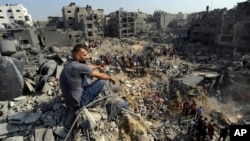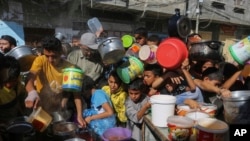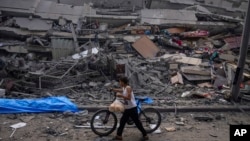A new U.N. report paints a stark picture of the collapse of the Palestinian economy after a month of war and Israel's near total siege of Gaza.
The gross domestic product shrank 4% in the West Bank and Gaza in the war's first month, sending more than 400,000 people into poverty, an economic impact unseen in the conflicts in Syria and Ukraine, or any previous Israel-Hamas war, the U.N. said.
Gaza's Hamas rulers launched a surprise attack on Israel on Oct. 7 killing more than 1,400 people, mainly civilians, and kidnapping about 240 others.
More than two-thirds of Gaza's population of 2.3 million have fled their homes since Israel launched weeks of intense airstrikes followed by an ongoing ground operation, vowing to obliterate Hamas. The Hamas-run Health Ministry in Gaza said Thursday that 10,818 Palestinians, including more than 4,400 children, have been killed so far.
The rapid assessment of the economic consequences of the Gaza war released Thursday by the U.N. Development Program and the U.N. Economic and Social Commission for West Asia was the first U.N. report showing the devastating impact of the conflict especially on the Palestinians.
If the war continues for a second month, the U.N. projects that the Palestinian GDP, which was $20.4 billion before the war began, will drop by 8.4%, a loss of $1.7 billion. And if the conflict lasts a third month, Palestinian GDP will drop by 12%, with losses of $2.5 billion and more than 660,000 people pushed into poverty, it projects.
U.N. Development Program Assistant Secretary-General Abdallah Al Dardari told a news conference launching the report that a 12% GDP loss at the end of the year would be "massive and unprecedented." By comparison, he said, the Syrian economy lost 1% of its GDP per month at the height of its conflict, and it took Ukraine a year and a half of fighting to lose 30% of its GDP, an average of about 1.6% a month.
At the beginning of 2023, the Palestinian territories – the West Bank and Gaza – were considered a lower middle-income economy with a poverty level of $6 per day per person, Economic Commission Executive Secretary Rola Dashti said.
In January, Gaza was grappling with high unemployment of about 46%, 3½ times higher than the West Bank's 13%, the report said.
But just weeks of war has destroyed hundreds of thousands of jobs.
"As the war hits the one-month mark, 61% of employment in Gaza, equivalent to 182,000 jobs, is estimated to have been lost," it said. "Around 24% of employment in the West Bank has also been lost, equivalent to 208,000 jobs."
Al Dardari pointed to the massive disruption to the economy in the West Bank, which is responsible for 82% of Palestinian GDP, explaining that this is supposed to be the season for olive and citrus farmers to collect their products, but they can't because of the war. And "the tourism season is practically gone – and agriculture and tourism represent 40% of the GDP in the West Bank," he said.
In addition, Al Dardari said, there are major disruptions to trade, to the transfer of money from Israel to the Palestinian Authority, which controls the West Bank, and no investment.
The Economic Commission's Dashti said "the level of destruction is unimaginable and unprecedented" in Gaza.
"As of November 3, it is estimated that 35,000 housing units have been totally demolished and about 220,000 units are partially damaged," she said. The report said at least 45% of Gaza's housing units have been destroyed or damaged.
If this persists, the majority of Gazans will have no homes. Al Dardari added that even if fighting ended now there will be massive long-term displacement, "with all its humanitarian, economic development and security consequences."
Al Dardari said it breaks his heart that the Palestinian territories had become lower middle income economies, "because all of that growth and development is going to regress between 11, 16, or even 19 years if the fighting continues. ... We will go back to 2002."














